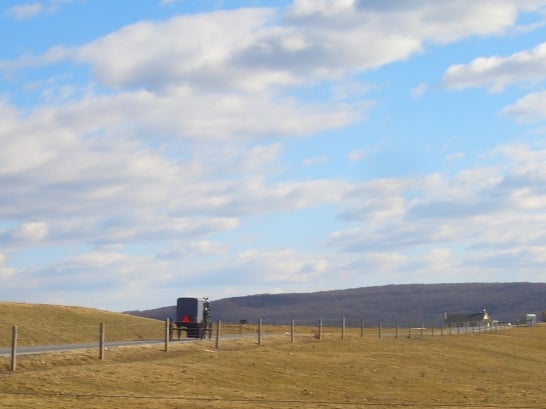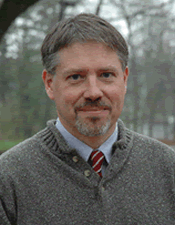Amish Bishop Charged For Failing To Report Abuse
An Amish bishop in Dauphin County, Pennsylvania is in the news for failing to report sexual abuse of two children in his church by another church member.
From Lancaster Online:
An Amish bishop in Dauphin County is facing charges after being accused of failing to report two cases of alleged sexual abuse of children.
Christ M. Stoltzfus, 69, is charged with two misdemeanor counts of failure to report, according to court documents.
…
A church member told Stoltzfus, of Elizabethville, about two cases both involving Daniel Ray Fisher, 44, that occurred in 2011. Stoltzfus reportedly told state police that he’d been told the abuse “wasn’t really that bad.”
Fisher allegedly touched two girls, ages 5 and 10, inappropriately, according to Fox43. He faces five felony and two misdemeanor charges including aggravated indecent assault of a child and unlawful contact with a minor – sexual offenses.
Stoltzfus is being charged because as the article notes, “clergymen are legally required to report suspected child abuse.”
As reported by Fox43.com, Stoltzfus admitted that not reporting abuse was “probably” a problem:
Troopers asked Stoltzfus if he thought it was a problem that sexual abuse was not being reported to law enforcement. Stoltzfuse responded “It probably is,” court records state. When state police pressed Stoltzfus that because he didn’t report the cases, it appeared as if the sexual abuse was being covered up. Stoltzfus replied, “Well that’s what happened in that case…I didn’t know everything,” according to the criminal complaint.
Why the silence?
This is one area where Amish have come in for criticism in the past. Matters such as domestic violence or child abuse which are crimes in the eyes of the law have been handled via church discipline and not handed over to state authorities.
Jim Cates, a clinical psychologist with a long history of work with the Amish, addresses the topic of reporting child abuse in commendable depth in Serving the Amish: A Cultural Guide for Professionals. Cates lays out several reasons why child abuse cases can go unreported in Amish communities, including:
- conflict between laws of the state and the Amish approach to dealing with sin
- the untrained ministry’s lack of experience in dealing with abuse
- the patriarchal ministry and culture being a barrier for females to report
- a community emphasis on peace and consensus makes exposing violators more difficult
Cates elaborates on the implications of disclosing abuse:
Almost all Amish people describe a similar culture of silence surrounding the topic of sexual abuse, an important consideration in any intervention. There is universal agreement that it is unacceptable. In parallel however, few acknowledge this abuse because of the ramifications. In some cases, a disclosure projects blame onto the victim, particularly if external authorities are involved. In other cases, the community gradually evolves the “problem” into the decision to report rather than the abuse itself. These potential outcomes pressure the victim (and the victim’s family) into silence due to feelings of guilt and responsibility.
Silence isn’t the blanket response in all Amish communities of course, as Cates describes in a section titled “Breaking Ranks: Reporting Abuse.” There can be one of several responses:
In some areas church leaders will not initiate a report to social services agencies or law enforcement, but neither will they censor such reporting by others. Some bishops express a belief that cases of abuse should routinely be reported to the law and that Amish offenders should not receive preferential treatment. Other bishops believe situations should be handled within the community without the involvement of state authorities.
But as he observes, “A system that relies on the public community to report–and by community I refer to physicians, schools, churches, concerned relatives, non-custodial parents, neighbors–is simply ineffective for them.” And following from this, “anecdotal evidence suggests that child abuse is underreported.”

Why is this system ineffective? As Cates explains, “We ask the Amish to violate a number of tenets of their faith by reporting child abuse.”
These include trusting in “the world,” looking to the state for help rather than within, and to violate the sanctity of confession “by prolonging the consequences of a sin that both the perpetrator and (often) the victim believe is now washed clean with the blood of Jesus.”
This of course, is not to justify not reporting abuse – only to note some of the reasons why it may go unreported among Amish.
Cates’ discussion of this difficult topic–which is intertwined with the fundamental concept of forgiveness that outsiders so often admire–is worth reading in full.






Time may not heal all wounds
Thank you for addressing this difficult topic.
As a survivor of molestation and rape (at 13), I remember telling my mother what happened only to have the incident ignored.
No one believed it happened, or reported the incident and no charges were filed.
Other than the loss of one’s child, there’s no feeling more horrific than being violated sexually and then being emotionally battered (thru victim shaming) at a time when the victim is at their most vulnerable.
I had the same experience. It is awful to tell your family that another member of the family is abusing you but to not be believed heaps more hurt and shame on the victim. It also instills a lack of trust in those adults who are suppose to be protecting you. There is no excuse for any adult to not report child abuse. Shame on the Bishop and any other adult for not reporting this abuse.
Abuse of the Innocent
The Amish people are not dumb people. They know the difference between right and wrong.
The Amish people are ignorant and hypocritical when they exhibit by their words, actions and behavior, that stealing a child’s innocence, in what ever manner, is not a crime and punishable by law.
To use their religion and cultural life style as a rational for inexcusable behavior is a travesty. The expression; “a “special place in ….” could and perhaps be applied to just this type of circumstance towards all people.
“Right is right no matter how many people are against it. Wrong is wrong no matter how many people are for it.”
– William Penn
Grateful to see topic addressed
As a survivor of molestation, I am glad to see this topic addressed. In whatever manner it is done within the family/community, I believe that the “victim/survivor” must be considered first. Innocence and a sense of security are lost. Faith in one’s own intuition is questioned. “Predators” of any level of contact must be made known & stopped from accessing others to hurt. Counseling for both “victim/survivor” & “predator” should be considered mandatory & right/acceptable.
Questions....
This appears to be so similar to the Catholic Church Scandal of late – that priests were shuffled around and not reported because they confessed to their confessors and were deemed to be forgiven by the sacrament. Their sins washed clean – their penance was generic – and the real reason nothing was reported was the fact that there was a priest shortage.
However, the Amish community has no shortage of people in their communities, and like the Catholic Church – they need to address this horrific and disgusting pedophile and evil domestic abusive behavior straight on by reporting it to the government agencies. This law-breaking has no excuse – and to not report it – is complicity and a grave sin unto itself. Domestic violence also seems to be blamed on the women (What did you do that made your husband hit you?) – in the Amish culture, I am starting to think the women are brainwashed. How could they allow this to happen to their children without justice? Not reporting domestic abuse, not reporting the sexual abuse of their children – or even worse – accepting the non-punitive damages of their Bishops. These are all grave sins. Not only for the Catholic Church, but for the Amish as well.
Of course, as a Catholic, I know that not all priests are pedophiles (I never encountered one in my life time, though I knew they existed elsewhere in the country) – just as I know not all Amish men are pedophiles, and not all Bishops are inclined to not report these heinous crimes.
My question is how prevalent is domestic violence and molestation in the Amish? Are there any statistics? Is anyone examining this? Are any of the clergy creating any sort of prevention programs (like the Catholic Church has done via Pope Francis in which none of this is tolerated at all)?
It’s all horrific, saddening, sickening and gravely sinful.
Judith, you are right — not all bishops choose to not report horrible crimes such as mentioned in this thread. In a recent case in our neighborhood, a horrific case of abuse was brought to the attention of the bishop through a family member. He confronted the abuser who really had no choice but to confess. He was told by the bishop he has (? I was thinking it was one day but someone else thought it was three days) to confess to the authorities or the bishop & ministers would do so for him. My understanding was that by the time the abuser (with the assistance of the ministers) contacted the law, the law had gotten word of this literally hours beforehand. They commended the ministry for reaching out to the law. I support this 100%. It’s one thing to have the church deal with confessions of doctrinal matters in-house, quite another when such perverseness is involved. Abuse against any person is wrong no matter who does it or why.
In this community, there is a “Restoration Committee” that serves as the go-between between the law and cases of reported or suspected abuse. The committee’s role is to know who to contact and how and to make immediate moves to separate abuser and victim and provide support for both as the legal process begins. Anticipating someone asking why the abuser needs support, I’ll say that regardless of the crime, he/ she is sick and our ultimate goal is to see that the abuser not only accept responsibility and make amends, but get as much help as is needed to prevent this from happening again. Also, the committee is a “safe place” for people to voice suspicion or seek advice. Much could be written, but this gives the basic idea.
Are there any statistics? Not that I know of, but even ONE case is far too many. I also struggle with the question of how a mother could fail to take action… I was once told some live in denial. I still don’t get it, but on the other hand, there ARE mothers who take action. So what makes the difference?
I think it’s also worth pointing out that there is going to be a huge difference depending on the “climate” or dynamics of each home, family, church district… Personally I would feel completely comfortable going to our home ministers about ANY concerns I had. Sadly, some people don’t have that relationship with their ministers. We’ve been blessed to have the ministers we do.
Hi Mark! Long time, no talk!
I’m glad to hear that your community has the right idea about reporting these crimes and getting help for the victims as well. The whole thing seems so opposite of what the Amish stand for and believe that it’s hard for me to read about it and even harder to wrap my head around the apathy in justice for the innocents. I think the next time the Bishops all get together – the idea of tracking this behavior, where is it most prevalent, who is not reporting, how many victims, how often, etc. etc. would be so important. The data from any sort of accounting could help the Amish in establishing centers for recovery for the victims and centers of rehabilitation (after incarceration) for the offenders. Though, from what I have read – pedophilia is notoriously hard to cure, so that person really should be identified as a person who is not to be trusted around children.
But until a study is done and data is gathered – there will be no impetus to follow-up on these crimes, even if reported to the govt. authorities. One must know the extent of the problem in order to combat it.
I’m thankful to your ministers who not only protect the innocent of their flock, but also ultimately will protect the future generations from that behavior by showing it will never be tolerated in the Amish lifestyle.
And what about the children?
Do the Amish (those who do believe it is a sin & crime to sexually abuse a child) offer any kind of help, therapy, counseling, for the children who are abused? Or do they truly believe forgiveness (child forgiving his/her abuser) is enough, adequate “therapy”? This (the effects on the kids) is what really concerns me. In this country (which offers freedom of religion), it shouldn’t matter what religion you follow…some things are just plain wrong/sinful…and to me, not helping the child (with counseling, psychotherapy, whatever) is a crime which needs to be dealt with as much as the abuse itself.
Alice Mary
My question exactly...
Mary Alice, this is the question I just addressed on my blog: http://salomafurlong.com/aboutamish/2017/05/abuse-among-the-amish-and-what-about-the-innocent-victims/
I feel so often in abuse cases among the Amish, there is too little advocacy for the abused children. The focus often stays on the perpetrator, just as it does in this particular one. Much ado is made about the perpetrator refusing counsel. So what! And then comes that question again: what about the children?
That was a great article Ms. Furlong – and a tremendously discouraging one. It is apparent that the Amish are treating the victims the same way the Catholic Church did theirs. What is wrong with all of these “religious” people? Yes, we all sin – but this is a whole other arena of sin and the damage to the victim is incalculable. Going to the source, collecting data, and reporting the crimes should be the only recourse in dealing with these serious crimes.
I’m really glad I found your blog! Thanks for posting it!
I agree with you, Alice Mary. In my limited experience with this, yes, help is arranged for. In our area there is a clinic (non-Amish) called Springhaven. That is an excellent place for any person in need of counseling, therapy, or other areas. (Like eating disorders, OCD) There are other options, like private psychiatrists, Freedom Hills, etc., but yes, help is available and as far as I know encouraged. (Though groups like the Swarztentrubers may be less inclined toward a non-Amish facility.)
And you are right — in such matters, religion does not enter into it at ALL. Sin is sin. My understanding is this kind of horrendous abuse of children might not be limited to just one, two, or three religious/ cultural groups but is an evil perversion that many “groups” have had to address. (Though some more righteously or effectively than others.)
Abuse
This is very sad, but not surprising considering that the Amish want to handle things in their own way.
Hi Judith!
I think one thing that needs to be kept in mind on this subject is the huge variety among the Amish. I’m not saying any particular group is more or less inclined towards having to deal with abuse, but rather how a church or community reacts is variable. I’m not questioning Saloma Furlong’s opinions or statements, but I will say it differs from what I see around me.
There isn’t a meeting where all the Amish bishops get together, but if there was, I’m sure this would be a topic of discussion! I agree that it seems that pedophilia is very difficult to “cure.” I do know of Amish individuals who have been removed from their homes and placed with childless couples or couples whose children are all grown and who have also been identified and must obey the legal restrictions about supervision, probation, etc. A simple check on-line of registered offenders can be a real eye-opener in ANY neighborhood. But even if pedophilia cannot be “cured,” it can be addressed and the abuser can be made aware of consequences and receive therapy that (it’s hoped) can help him control his actions. (Or so I understand from reading.)
I’m thankful for ministers who do seek to protect our children but who also seek to stop the potential abusers from doing things that will not only harm a child, but leave them with guilt and fallout that will damage themselves as well.
There was a very helpful booklet put out locally some years ago that was put together by local Amish leaders, law enforcement, and counseling or mental health providers and it is encouraged reading in our circle. I know that as a parent, it was very helpful for me to read this and know how to address it with our children.
Abuse and Forgiveness
I am late to this discussion – I was interested in the title Erik posted, and filed it for future reading, with no idea he quoted from “Serving the Amish!” Thanks for your kind words, Erik. This touches on another Amish/English distinction that is very important, and that is our view of forgiveness. We (English) contribute to the problem when we are so very moved by the Amish willingness to forgive a mass murderer, as in the Nickel Mines killings, but fail to see forgiveness of a sex offender in their own community as the opposite side of the same coin. For us, they are vastly different types of forgiveness. For the Amish? If a sin has been confessed, it needs to be forgiven and forgotten. Wrestling with how to do that and still hold the sinner accountable is a slow process of understanding and change in their communities. It is happening, as the posts above suggest, but it is slow, and must be accomplished while maintaining their principle of a Christ-like forgiveness. I admire and respect so much those among the Amish who are working to make these changes.
Thanks everyone for sharing on this difficult topic. Mark I appreciate you sharing a bit of the behind-the-scenes as to how these cases are handled in your community. Hopefully those communities which don’t have a way of properly handling these transgressions will take an example from those that do.
And Jim, glad this showed up on your radar, you know I appreciate your book and how it covers some very difficult subjects with honesty and at the same time respect towards the Amish. I think it was not at all an easy one to write but I suspect it’s done a lot of good, and I hope that more in both the Amish and non-Amish communities who might be facing these types of issues will read it.
Update - Bishop pleads guilty
http://lancasteronline.com/news/local/amish-bishop-pleads-guilty-in-dauphin-county-court-to-failure/article_05c2ab12-972c-11e7-8eec-cb5d24ff0b4a.html
An Amish bishop pleaded guilty in Dauphin County court last week to a charge of failure to report child abuse.
Christ M. Stoltzfus, 70, of Elizabethville, entered the plea Thursday before Judge Deborah E. Curcillo and was sentenced to three months probation, according to the Dauphin County District Attorney’s Office.